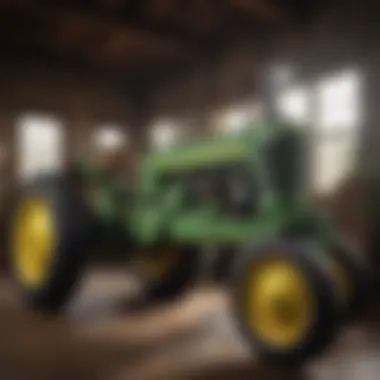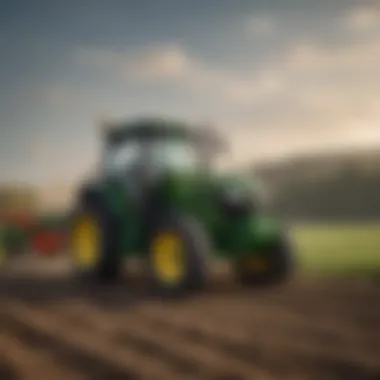Understanding John Deere in Florence, Alabama


Intro
John Deere has long been a pivotal force in the agricultural landscape of the United States, embodying a commitment to innovation and support for farmers. In Florence, Alabama, this legacy is particularly evident. This area has benefited from John Deere’s products and services, which have transformed the manner in which local farmers approach their work. This article seeks to unpack the significance of John Deere’s presence in this region, delving into its historical roots, current product offerings, and broader implications for agricultural practices.
As we navigate through John Deere's initiatives in Florence, several key points will emerge. First, we will explore the company’s historical context, which lays the groundwork for its ongoing influence. Second, the discussion will extend to the array of products available to local farmers. Furthermore, we will examine John Deere's community engagement efforts and how these efforts translate into tangible support for local agriculture. Finally, we will investigate the company’s role in pushing forward agricultural technology, which fosters efficiency and sustainability. Let us begin our detailed overview.
Preface to John Deere
The importance of understanding John Deere transcends its role as a mere equipment manufacturer. In the agricultural sector, John Deere stands as a symbol of reliability and innovation. Its impact extends throughout various aspects of farming and land management, and this section aims to elucidate the company's foundations and significance globally and locally in Florence, Alabama. By examining both the historical context and the global outreach, readers can appreciate how John Deere not only plays a critical role in agriculture but also in technological advancement and community engagement.
Company History
John Deere is a name synonymous with agricultural machinery. The company was founded in 1837 by John Deere, a blacksmith residing in Illinois. Initially, Deere created his first plow from broken steel. This innovation allowed farmers to more efficiently turn the soil. Since then, the company has grown from a small blacksmith shop into a global leader in equipment manufacturing.
Over the years, John Deere has adapted to economic shifts and technological advancements. From steam plows to modern GPS-guided machinery, Deere's history reveals an ongoing commitment to improvement. Additionally, the company has expanded its offerings, now including not just tractors but also harvesting equipment, lawn care machines, and construction equipment. This adaptability has been pivotal for its sustainability and advancement.
Global Presence
John Deere's global presence is noteworthy. The company operates in over 160 countries, catering to a diverse range of agricultural and construction needs. Its international reach enables it to leverage regional strengths and tailor products to meet local demands. For instance, in countries like India and Brazil, John Deere has modified equipment to suit varying farming techniques and soil conditions.
This broad geographic footprint highlights Deere's strategic approach to business. By understanding market demands in different regions, the company has maintained its reputation as a leader in agriculture and equipment manufacturing.
"John Deere is not just about manufacturing, it's about understanding the needs of the land and its farmers across the globe."
Through extensive investment in research and development, John Deere continues to pioneer innovative technologies. The commitment to precision agriculture and efficient farming practices is evident in their global strategy. Farmers benefit not only from reliable equipment but also from advanced solutions designed to enhance productivity and sustainability.
In summary, John Deere holds a significant position in the agricultural market, shaped by a rich history and extensive global operations. Understanding its evolution and current standing in different regions, especially Florence, Alabama, will provide valuable insights into its impact on local agriculture.
John Deere in Florence, Alabama
John Deere's presence in Florence, Alabama, plays a vital role not only for the company but also for the local economy and agricultural landscape. This region, steeped in agricultural heritage, benefits greatly from John Deere's innovative products and community initiatives. The operations here enhance the local agricultural processes and provide employment opportunities to numerous residents. Understanding the implications of John Deere's activities in Florence highlights its influence on farming practices and economic growth in the area.
Geographical Significance
Florence, Alabama is located in a region characterized by fertile land, making it ideal for agricultural activities. This geographical advantage is crucial for John Deere, as it positions the company close to its customer base. Farmers in this area rely heavily on specialized agricultural machinery to maintain productivity. The proximity helps John Deere to respond swiftly to local needs. Its location affects the supply chain and accessibility of products and services for farmers who require timely solutions, especially during peak seasons. Moreover, the area’s favorable climate terms encourages innovative practices in agriculture, furthering diversification and sustainability.
Local Manufacturing Facilities
John Deere operates several manufacturing facilities in Florence, which are central to its production processes. These facilities focus on producing a variety of agricultural equipment that meets the specific needs of the local farming community.
- Job Creation: The manufacturing sites provide job opportunities to local residents, contributing to the economic stability of the community.
- Skill Development: Furthermore, these facilities offer training programs that enhance the skills of workers, promoting a knowledgeable workforce capable of operating sophisticated machinery.
- Sustainability Initiatives: These facilities are also involved in sustainable practices, which aim to reduce their environmental impact. This includes efforts to recycle materials and implement energy-efficient processes.
John Deere's local manufacturing efforts align with global sustainability goals while ensuring that farmers' needs continue to be met efficiently.
Overall, the local facilities are integral to maintaining both the workflow of John Deere and the agricultural productivity of the surrounding area. They serve as a nexus of innovation, job creation, and community support that benefits all stakeholders involved.
Product Offerings


Understanding the product offerings of John Deere is crucial for comprehending its overall impact in Florence, Alabama. John Deere does not merely manufacture equipment; it empowers farmers by providing advanced solutions to improve productivity. The range of products includes machinery, tools, and software designed specifically for agricultural needs. By offering efficient and effective tools, John Deere plays an essential role in modernizing farming practices in the region.
Tractors and Equipment
John Deere is globally recognized for its high-quality tractors and farming equipment. The company produces a variety of models tailored to meet the diverse needs of farmers.
- Versatility: John Deere tractors can adapt to a range of tasks from plowing to planting. This capability helps farmers optimize their operations by reducing the time and labor involved in agricultural processes.
- Durability: The equipment is built to last. Farmers invest in John Deere's tractors knowing they can endure the rough conditions often seen in agricultural settings.
Additionally, the ease of maintenance stands out. Many owners find that repairs and service require less time, allowing farmers to focus on production rather than equipment downtime.
Innovative Technology
The incorporation of innovative technology in agriculture has revolutionized farming practices. John Deere leads in this aspect by continually introducing advanced systems and solutions designed to enhance efficiency.
Precision Agriculture
Precision agriculture represents a significant shift in how farmers manage their fields. This approach uses data analysis to optimize farming practices. Key characteristics of precision agriculture include:
- Data-driven Decisions: This methodology relies on detailed data collection to make informed choices about planting, fertilization, and pest control. Farmers can monitor environmental variables and adjust strategies accordingly, leading to better yields.
- Resource Management: It enhances efficiency by ensuring that resources such as water and fertilizers are used judiciously. This not only reduces costs but also minimizes environmental impact.
A unique feature of precision agriculture is the ability for real-time monitoring. This helps farmers react promptly to changing conditions in the field. The advantages of these systems often outweigh the initial investment, making it a popular choice among local farmers.
Integration with Software Solutions
Integration with software solutions is another critical aspect. It connects machinery and farming processes to platforms that facilitate data management and analysis.
- Streamlined Operations: By linking tractors with software tools, farmers can streamline their operations. This integration allows for automated reporting and better management of resources.
- Enhanced Planning: Farmers can plan their activities with detailed insights into weather patterns, crop health, and soil conditions. The software interprets this data to provide recommendations tailored to specific needs.
A unique feature of these software solutions is their user-friendly interfaces. They are designed to make the technology accessible to farmers of all experience levels. The only disadvantage might be the learning curve, but this is generally manageable given the support John Deere provides.
"In essence, John Deere's commitment to both machinery and innovative technology positions it as a leader in the agricultural sector, ensuring that Florence, Alabama, remains at the forefront of farming advancements."
In summary, John Deere's product offerings encompass a spectrum of equipment and technologies that significantly enhance farming efficiencies. Through tractors, equipment, and integrated technologies, the company ensures farmers have the tools necessary to succeed in a competitive marketplace.
Impact on Local Agriculture
The involvement of John Deere in Florence, Alabama, has a significant impact on local agriculture. With their established presence, they provide essential resources for farmers, enabling them to enhance productivity, sustainability, and overall efficiency. Understanding this impact allows for a deeper appreciation of how agricultural practices evolve in the region.
John Deere's contribution goes beyond providing machinery. It fosters economic growth, supports local communities, and implements advanced agricultural technologies. All these elements are crucial as they help farmers adapt to changing market demands and environmental conditions.
Economic Contributions
John Deere plays a vital role in the economy of Florence. It does not only employ a substantial number of workers but also stimulates jobs in surrounding sectors. Many local small businesses thrive due to the demand for parts, services, and support associated with John Deere operations.
- Job Creation: The local manufacturing facilities offer various employment opportunities ranging from assembly line work to management positions.
- Local Supply Chain Development: John Deere sources materials and services from local suppliers, creating a ripple effect of economic activity around Florence.
- Community Investments: The company invests in community projects, improving infrastructure and services that benefit residents and farmers alike.
John Deere's commitment to Florence showcases how a single corporation can transform a local economy through strategic investments and operations.


Support for Farmers
The support provided by John Deere to local farmers is multi-faceted. They understand the challenges that farmers face, from financial constraints to the need for cutting-edge technology. Through various programs and resources, they aid in enhancing agricultural efficiency and sustainability.
- Advisory Services: Farmers receive guidance on best farming practices and the optimal use of equipment. This ensures that they can maximize the output with the available resources.
- Training and Workshops: Regular sessions focus on new technologies and farming methods. This helps farmers stay updated on industry advancements.
- Financial Support: Certain programs offer loan assistance and financing options, enabling farmers to invest in necessary equipment and technologies without financial strain.
Community Engagement
Community engagement is a vital component of John Deere's operations in Florence, Alabama. This engagement is not merely a side initiative; it represents the company’s commitment to connecting with the local community and enhancing the livelihoods of farmers and residents in the region. The impact of John Deere extends beyond selling agricultural equipment. They actively participate in local activities and initiatives that create mutual benefits. Engaging with the community results in higher goodwill, trust, and collaboration between the company and local stakeholders.
Local Events and Sponsorships
John Deere takes pride in its involvement in local events. These events are usually designed to foster connections and support the community’s agricultural aspirations. Through sponsorships and participation, John Deere contributes to various fairs, workshops, and exhibitions. These events often serve multiple purposes:
- Showcase Products: Local events allow farmers to see John Deere’s latest innovations in equipment.
- Networking Opportunities: They provide a platform for farmers to connect with each other, share ideas, and improve practices.
- Community Building: Supporting local initiatives builds relationships, making John Deere a recognized partner in the region.
Furthermore, John Deere sponsors youth programs, promoting interest in agriculture among younger generations. Such initiatives help cultivate future leaders in the agricultural sector. This commitment to engagement shows that John Deere understands the importance of community support in advancing local agriculture.
Educational Programs
Educational programs initiated by John Deere play a crucial role in community engagement. These programs focus on providing farmers with the necessary knowledge and skills to improve their practices. Training sessions often center on efficiency, sustainability, and new technologies in agriculture. These initiatives have several benefits:
- Skill Development: Farmers acquire hands-on knowledge about the latest agricultural innovations.
- Sustainability Practices: Education often highlights sustainable farming methods, which is vital for future generations.
- Community Support: By empowering farmers through education, John Deere strengthens local agriculture.
John Deere collaborates with local universities, agricultural institutes, and extension services to ensure that farmers have access to relevant, practical training. It’s not just about promoting their products; it’s about equipping the community with the tools they need to thrive. These educational outreach efforts demonstrate the company’s long-term commitment to fostering a resilient agricultural community in Florence.
"Education and community engagement are fundamental to the long-term success of agriculture. John Deere’s initiatives exemplify this commitment to fostering sustainable farming practices."
In summary, John Deere's community engagement in Florence, Alabama, revolves around meaningful local events, sponsorships, and educational programs. This approach creates a symbiotic relationship that benefits both the company and the community, ensuring that agriculture remains vital in the region for years to come.
Sustainable Practices
Sustainable practices are crucial in modern agriculture, particularly in relation to companies like John Deere in Florence, Alabama. These practices ensure that farming is not only productive but also responsible towards the environment and future generations. Sustainability in agriculture encompasses a range of strategies that aim to reduce environmental impact, enhance productivity, and promote economic viability. In this context, John Deere's efforts serve as a model for integrating advanced technology with sustainable principles.
Environmental Initiatives
John Deere has embarked on several environmental initiatives aimed at reducing its carbon footprint and promoting eco-friendly practices. One significant aspect of these initiatives is the commitment to reducing greenhouse gas emissions from the manufacturing processes. This includes the implementation of energy-efficient technologies and practices within their facilities in Florence.
In addition, John Deere promotes responsible water use and waste management strategies. These efforts often involve recycling programs and improved water management techniques that help farmers minimize water usage while maximizing crop yields. The company also emphasizes the importance of biodiversity in agricultural practices, helping ensure ecosystems thrive alongside farming activities.
Some key components of John Deere's environmental initiatives include:
- Energy conservation: Reducing energy intake through advanced production techniques.
- Waste reduction: Implementing recycling initiatives in both manufacturing and product life cycles.
- Water efficiency: Promoting technologies that reduce waste water use.
"Sustainability not only helps our planet but enhances our agricultural productivity," says one of the local farmers utilizing John Deere products.
Sustainable Farming Technologies


Sustainable farming technologies developed by John Deere empower farmers to practice more responsible cultivation techniques. These technologies are designed to optimize crop management and resource use while minimizing environmental harm. For instance, precision farming methods enable farmers to apply fertilizers and pesticides more accurately, reducing excessive application.
Such technologies include:
- Precision Agriculture: Utilizing GPS systems and data analytics to monitor field conditions and improve planting decisions.
- Integration with Software Solutions: Using platforms that analyze crop data to inform sustainable practices and crop rotation strategies.
The role of John Deere in advancing these sustainable farming technologies cannot be overstated. Their focus on futures farming techniques reshapes how crops are cultivated, leading to better yields with less environmental strain. In Florence, these technologies are integral to enhancing agricultural sustainability while ensuring economic stability for local farmers.
Future Developments
Future developments in agriculture are crucial as they help shape sustainability and efficiency in farming practices. John Deere, with its long history of innovation, is positioned to lead several of these promising directions. The intersection of technology and agriculture is more significant than ever. This section will delve into the innovative trends emerging in agriculture and explore John Deere’s strategic vision for the future.
Innovative Trends in Agriculture
The modernization of the agricultural landscape is driven by several key trends that aim to enhance productivity while addressing environmental concerns. These trends include:
- Precision Farming: This approach utilizes GPS technology and data analytics to optimize field-level management about crop farming. Farmers can apply the right amount of inputs at the right time and place, which boosts yields and reduces waste.
- Automation and Robotics: Autonomous tractors and drones are becoming more prevalent. These technologies reduce the labor burden and improve efficiency through tasks like planting, monitoring, and crop spraying.
- Sustainable Practices: More farmers are adopting practices that promote soil health and biodiversity. These include no-till farming, cover cropping, and integrated pest management.
"The integration of technology with traditional practices signifies a renaissance in agriculture, paving the way for more informed and sustainable decisions."
- Data-Driven Decision Making: Farmers are leveraging big data to make impactful decisions regarding crop rotation and resource allocation. The insights gained can lead to better yields and lower costs.
As technology advances, John Deere is likely to lead the charge in these areas, developing products that help farmers navigate this changing landscape effectively.
John Deere's Strategic Vision
John Deere’s strategic vision focuses on integrating advanced technology into its product lines. This commitment includes:
- Investing in Research and Development: John Deere constantly dedicates resources to R&D to innovate and improve its equipment and software.
- Collaboration with Technology Partners: Partnerships with tech companies enhance the company’s capabilities in AI and machine learning, providing farmers with tools that make their jobs more manageable.
- Focus on Sustainability: An area of emphasis is the development of equipment that minimizes environmental impact, promoting practices that support long-term agricultural sustainability.
- Customer-Centric Solutions: The company aims to build equipment that directly addresses the specific needs of farmers. Listening to customer feedback allows for much more tailored solutions.
In summation, John Deere’s forward-looking approach signifies its commitment to advancing the agricultural sector. By staying at the forefront of both technology and sustainable practices, the company is poised to not only meet the demands of modern agriculture but also to create a healthier ecosystem for future generations.
Closure
The conclusion of this article emphasizes the significant role John Deere plays in Florence, Alabama, and how its operations affect various stakeholders in the agricultural ecosystem. The comprehensive overview reveals not just the historical roots of the company but also its forward-looking strategies that align with modern demands in farming.
Summary of Key Points
- Historical Context: John Deere has a rich history that has shaped its identity in the agricultural sector. This legacy influences its brand reputation and trust among local farmers.
- Local Impact: The presence of John Deere in Florence has led to significant economic contributions. This includes job creation and support for local businesses.
- Product Innovation: From tractors to advanced technology solutions, John Deere continues to offer products that enhance productivity and efficiency in modern farming.
- Community Engagement: The involvement of John Deere in local events and educational programs reflects its commitment to supporting the community and promoting agricultural education.
- Sustainability Efforts: The initiatives aimed at promoting sustainable practices show the company’s dedication to environmental responsibility.
Looking Ahead
Cited Works
Detailed citations contribute significantly to the credibility of the article. A variety of sources such as books, journal articles, reports, and online resources are essential in establishing a robust framework. Some of the notable works that are cited include:
- The History of John Deere by Charles N. T. H. Forsyth, which provides an in-depth view of the company’s background and development.
- Precision Agriculture: A Comprehensive Approach by James L. Oswald, a scholarly article that offers insights into the evolving technologies and practices in agriculture.
- Community Engagement and Corporate Responsibility as seen on platforms like Facebook, which outlines John Deere's interactions with local communities.
- Historical insights from Wikipedia, which highlight its geographical significance in Florence, Alabama.
These references not only substantiate the discussions around John Deere's influence but also encourage further exploration of the themes presented.
Further Reading
For anyone interested in expanding their knowledge beyond the scope of this article, several recommended readings can enhance understanding of John Deere and agricultural advancements. Here are a few sources to consider:
- "The Importance of Agriculture in American History" on Britannica, providing background on agriculture's evolution in the United States.
- Articles and discussions available on Reddit, which often feature community insights on agricultural practices and John Deere's role in the industry.
- Innovative Farming Techniques: Exploring the intersection of technology and farming, found in various online databases and journals.
- Sustainable Agriculture Practices: This literature can provide valuable perspectives on environmental initiatives related to John Deere.















